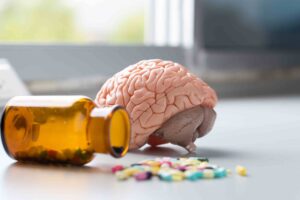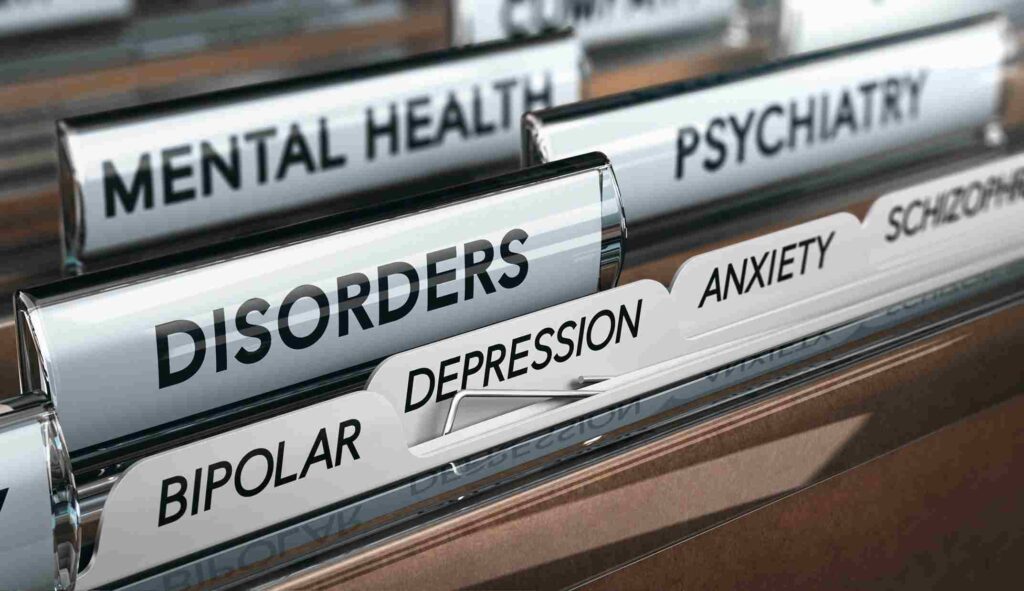In the complex web of health and wellness, mental health and addiction often intersect, creating challenges that are uniquely intertwined. This connection can be daunting, not only for those experiencing it but also for their families and loved ones. Hence, here, we will explore how these two areas are linked, discuss common co-occurring disorders, and provide insight into effective strategies for treatment and support.
Contents
How Does Mental Health Contribute To Addiction?
 Mental health and addiction are often closely linked in what experts refer to as a bidirectional relationship. Here are some ways in which mental health issues can contribute to the development and progression of addiction:
Mental health and addiction are often closely linked in what experts refer to as a bidirectional relationship. Here are some ways in which mental health issues can contribute to the development and progression of addiction:
- Self-Medication
Many individuals with mental health disorders turn to substances as a way to cope with their symptoms. For example, a person suffering from anxiety might use alcohol to feel more at ease in social situations. This self-medication can initially provide relief, but over time, it often leads to dependency and worsens the condition.
- Altered Brain Chemistry
Conditions like depression and anxiety can alter levels of neurotransmitters such as dopamine and serotonin, which are also affected by substance use. This can create a cycle where a person uses substances to restore their neurotransmitter levels to feel normal, inadvertently reinforcing addictive behaviors.
- Impaired Judgment and Impulse Control
Mental health issues can impair cognitive functions, increasing the likelihood of risky behaviors, including substance abuse. For instance, individuals with bipolar disorder during manic phases might engage in risky behaviors such as excessive spending, unsafe sex, or substance use.
- Social Isolation
Mental health problems can lead to social isolation, either through withdrawal or because of the stigma associated with the condition. Loneliness and lack of social support can drive individuals toward substance use as a way to fill the void.
- Stress and Trauma
Chronic stress, traumatic events, and unresolved trauma are significant contributors to both mental health issues and addiction. The intense emotional pain of these experiences can lead individuals to use drugs or alcohol as a form of escape, setting the stage for addiction.
Understanding these pathways can help in developing more effective treatment strategies. This addresses both mental health and substance use issues comprehensively.
What Is The Link Between Addiction And Depression?
 The link between addiction and depression is particularly significant due to their mutually reinforcing effects. Depression often leads individuals to seek comfort or escape from their persistent feelings of sadness, hopelessness, or emptiness through substance use. Substances like alcohol, which is a depressant, can initially mask the symptoms of depression, offering temporary relief or a euphoric escape.
The link between addiction and depression is particularly significant due to their mutually reinforcing effects. Depression often leads individuals to seek comfort or escape from their persistent feelings of sadness, hopelessness, or emptiness through substance use. Substances like alcohol, which is a depressant, can initially mask the symptoms of depression, offering temporary relief or a euphoric escape.
However, as the effects of the substance wear off, individuals might experience even deeper bouts of depression, creating a cycle of use and emotional downturn. Over time, the use of addictive substances can exacerbate the symptoms of depression by altering brain chemistry. Chronic substance use affects neurotransmitters related to mood regulation, such as serotonin and dopamine.
This disruption can lead to more severe depressive episodes and decrease the effectiveness of the natural reward systems of the brain. Eventually, this makes it more difficult for individuals to find pleasure in previously enjoyable activities without the substance.
What Are The Risks of Mental Health And Addiction?
The risks associated with the co-occurrence of mental health and addiction are substantial. And, affecting various aspects of an individual’s life. Here are some of the primary risks:
Worsening of Both Conditions
When mental health issues and substance abuse coexist, each condition can exacerbate the severity of the other. For example, substance abuse can increase the frequency and intensity of mental health symptoms. While mental health disorders can lead to increased dependency on substances as a coping mechanism.
Increased Risk of Suicide
The presence of both addiction and mental health disorders significantly raises the risk of suicidal thoughts and behaviors. Substances can impair judgment, increase impulsiveness, and exacerbate feelings of despair or hopelessness. All of which are risk factors for suicide.
Physical Health Decline
Addiction and mental health disorders can each take a toll on physical health, but together, they can lead to more severe health complications. These can include liver disease, heart disease, increased risk of infections, and an overall weakened immune system. Additionally, the neglect of personal hygiene and health care that often accompanies severe mental health issues and addiction can further deteriorate one’s physical condition.
Social and Relationship Problems
These conditions can lead to strained relationships with family and friends due to behaviors such as withdrawal, aggression, or deceit related to substance use. Social isolation can become more pronounced, which in turn can worsen both mental health and addiction problems.
Economic and Legal Issues
Individuals struggling with addiction and mental health issues are more likely to face financial difficulties due to unemployment or the inability to maintain steady employment. Additionally, there might be increased spending on substances or legal costs associated with substance-related offenses.
Barriers to Effective Treatment
Treating either condition can be challenging, but when they co-occur, the complexity increases. There may be reduced effectiveness of treatment due to non-compliance or relapse into substance use as a coping mechanism for untreated or poorly managed mental health symptoms. This can lead to a cycle of brief recoveries followed by relapses.
Addressing both mental health and addiction requires an integrated treatment approach that recognizes the complexity of these interacting disorders. Such an approach can offer better recovery outcomes by simultaneously addressing the symptoms and root causes of each condition.
How To Treat Mental Health And Addiction?
 Treating mental health and addiction often requires a comprehensive, integrated approach that addresses both conditions simultaneously.
Treating mental health and addiction often requires a comprehensive, integrated approach that addresses both conditions simultaneously.
Treatment Approaches
Here are some key components of effective treatment:
Dual Diagnosis Assessment
Begin with a thorough evaluation to identify and diagnose both the mental health disorder and the addiction. This assessment should involve gathering information about the individual’s medical history, substance use patterns, mental health symptoms, and any co-occurring medical or psychiatric conditions.
Medication Management
In some cases, medication may be necessary to manage symptoms of mental health disorders such as depression, anxiety, or psychosis. Medications can also be prescribed to aid in the detoxification process and reduce cravings during addiction treatment. Medications must be carefully monitored and adjusted as needed by qualified healthcare professionals.
Psychotherapy
Individual and group therapy sessions are essential components of treatment for both mental health disorders and addiction. Cognitive-behavioral therapy (CBT), dialectical behavior therapy (DBT), and motivational interviewing are among the evidence-based approaches commonly used to address both conditions. Therapy helps individuals understand the underlying causes of their behaviors, develop coping skills, and learn healthier ways to manage emotions and stress.
Support Groups
Participating in support groups, such as Alcoholics Anonymous (AA), Narcotics Anonymous (NA), or SMART Recovery, can provide invaluable peer support and encouragement during the recovery process. These groups offer a sense of community, accountability, and the opportunity to learn from others who have faced similar challenges.
Integrated Treatment Programs
Opt for treatment programs that specialize in dual diagnosis or co-occurring disorders. These programs offer comprehensive services that address both mental health and addiction simultaneously, often through a combination of medication management, therapy, life skills training, and holistic approaches such as yoga or mindfulness practices.
Holistic Approaches
Incorporate holistic approaches to treatment that focus on the individual’s overall well-being, including nutrition, exercise, sleep hygiene, and stress management techniques. Holistic therapies such as art therapy, music therapy, and equine therapy can also complement traditional treatment methods and provide additional avenues for self-expression and healing.
Continued Care and Aftercare Planning
Recovery from mental health disorders and addiction is an ongoing process that requires long-term commitment and support. Develop a comprehensive aftercare plan that includes ongoing therapy, support group attendance, regular medical check-ups, and strategies for relapse prevention. Stay connected to supportive networks and resources to maintain sobriety and mental wellness over time.
Family Involvement
Involve family members and loved ones in the treatment process whenever possible. Family therapy sessions can help improve communication, address relationship issues, and provide support for both the individual in treatment and their family members.
By addressing both mental health and addiction concurrently and utilizing a combination of these treatment approaches, individuals can achieve better outcomes and enhance their overall quality of life in the journey toward recovery.
Is Addiction a Brain Disease?
 Yes, addiction is widely recognized as a brain disease that profoundly affects the structure and functioning of the brain. Research has shown that addiction involves changes in the brain’s reward system, as well as other neural circuits related to motivation, memory, and self-control. Substance abuse alters the levels of neurotransmitters such as dopamine. It plays a key role in the brain’s reward pathway.
Yes, addiction is widely recognized as a brain disease that profoundly affects the structure and functioning of the brain. Research has shown that addiction involves changes in the brain’s reward system, as well as other neural circuits related to motivation, memory, and self-control. Substance abuse alters the levels of neurotransmitters such as dopamine. It plays a key role in the brain’s reward pathway.
Moreover, addiction is characterized by a chronic and relapsing course, with periods of abstinence often followed by relapse. This pattern is partly attributed to the lasting changes in the brain’s structure and function caused by addiction. Even after periods of sobriety, the brain remains sensitized to the effects of the substance, and cues associated with drug use can trigger intense cravings and impulsive behaviors.
Recognizing addiction as a brain disease helps to reduce stigma and promote a more compassionate understanding of the challenges faced by individuals struggling with substance use disorders. It also underscores the importance of evidence-based treatments that address the underlying neurobiological mechanisms of addiction.
Conclusion
In conclusion, the intersection of mental health and addiction presents complex challenges that require the best approaches to treatment and support. By understanding the link between these two conditions and addressing them concurrently, individuals can achieve better outcomes and enhance their overall well-being. Through medication management, therapy, support groups, and holistic approaches, recovery from mental health disorders and addiction is possible.
It’s essential to destigmatize addiction as a brain disease and promote a compassionate understanding of the struggles faced by those affected. With community support, we can work towards breaking the cycle of addiction and fostering a positive society.
